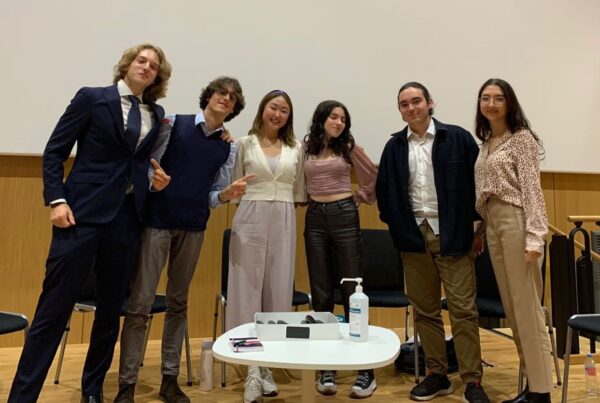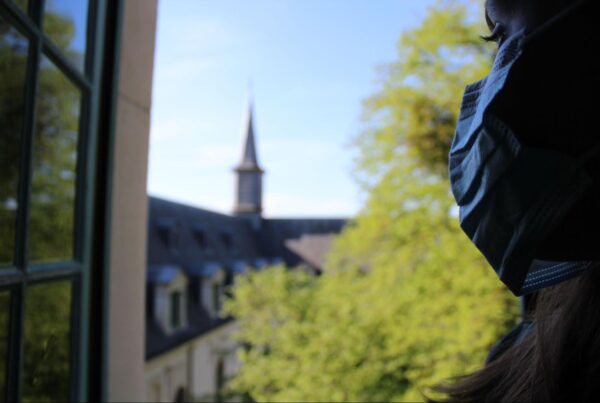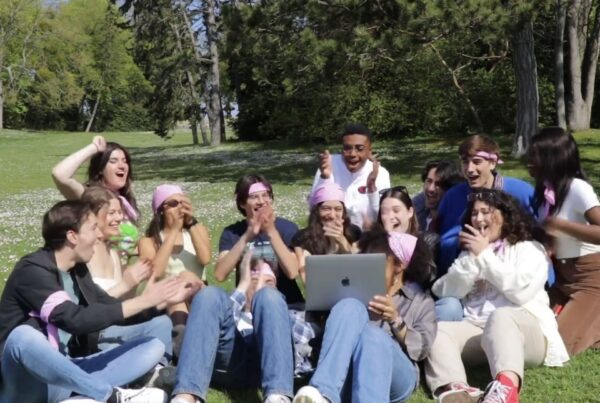 Interview by Damien Jahan and Juliette Laffont
Interview by Damien Jahan and Juliette Laffont
This interview and the other campaign list interviews were conducted on Zoom by writers of the Sundial Press. To ensure uniformity across list interviews, interviewees were given the same amount of time to answer questions, and lists for the same permanent bureau (ex. the two BDA lists) received the same questions. The interviewees had not seen the questions they would be asked, and a member of the campaign committee also assisted and supervised the interview. Although the interviews have been edited for clarity and concision, everything written was said by the list members.
List members:
Executive Pole
Alix Ardore: Co-president, French (EURAM)
Sébastien Negrier: Co-president, French (EURAF)
Alice Flaix: Treasurer, French (EURAM)
Quentin Prevot: Secretary general, French (EURAM)
Victor jardin: Vice-president, French Italian (EURAF)
Info-Com Pole
Elise Lafrouji: French (EURAM)
Eva Sadana: American and Indian (EURAM)
Culture Pole
Alice Latella: Italian (EURAM)
Sacha Flichy: French (EURAM)
Elias Largo: French (EURAM)
Lifestyle Pole
Julia Hope: South African (EURAM)
Fantine Perard: French (EURAF)
Romain Martin: French (EURAF)
Action Pole
Carl Philip Dybwad: Norwegian (EURAM)
Matthew Capuano-Rizzo: American (EURAF)
Ivar Arnesen: Norwegian (EURAF)
Q: Why is your list running?
Sébastien Negrier: On est représentants de SPE, un bureau qui porte un certain thème, une certaine idée, et qui est plus qu’une simple association pour la vie étudiante. On essaie de développer les missions de cette année, de voir ce qui a marché/pas marché, ce qu’on peut faire en conséquence, d’orienter nos actions par rapport à nos idées (c’est par exemple pour ça que l’on a modifié les pôles).
(We’re representing SPE, a bureau that carries a certain theme, a certain idea, and which is much more than a mere association for student life. We try to build on this year’s projects, looking at what worked or didn’t, to see what we can do about it, namely to gear our actions toward our ideas (a reason why we’ve changed the poles for instance).)
Julia Hope: I think what is really special about our team is that we don’t all have the same goals for SPE, which is really needed if you want an association to be representative of different opinions. We have people who are really motivated for SPE to be something more linked to students’ lifestyle and activities and then we have people who are motivated for SPE to be the form in which we can bring about institutional change and I think the combination of these two makes our list really cool for next year. At the core of our association is doing our lifestyle change but also being a form that is also accountable for the transition that has happened in Sciences Po itself.
Alice Latella: Also, regarding our name, I think it’s really important to mention that we chose the name Greengage because we want to engage in the environment, not only raise awareness but also engage and act with the students. We believe that we should not be confined in our association of 16 members because the environment is our future, and we need to act now! And that’s why we decided to run for the campaign!
Romain Martin: Pour compléter ce que disait Alice, le fer de lance de la liste, c’est vraiment que l’on soit là pour rendre possible l’action des étudiants de Sciences Po: on est pas là pour faire l’action en tant que tel, mais on est là en tant qu’interface entre l’action des étudiants et l’environnement, que ce soit sur le campus ou en dehors, et c’est d’ailleurs en partie pour cela qu’on a revu les pôles.
(To build on what Alice said, the spearhead of our list is really that we are here to enable the action of Sciences Po students: we’re not here to do the action itself, but we’re here as an interface between the students’ action and the environment, be it on campus or outside, and that also partly explains why we’ve reconsidered the poles.)
Julia: In terms of action, people are getting more and more motivated around the world to bring change, although it can be really hard. SPE is the foundation that allows students and the administration to commit to this transformation, and I think it’s so integral: any change that has to happen in this institution has to happen in institutions around the world, and Sciences Po needs to sort of “get with it” because universities are a place and a forum where so much of this discussion is happening and so much of this change is becoming evident and real.
Q: What would be your propositions to enable making the campus a more environmentally.friendly place?
Julia: The Pôle Lifestyle is about our consumption, meaning: compost facilities, expanding our panier bio, cafe ecolo, many alimentation and food issues: it’s about providing students with a concrete alternative and making it easy for students to make this transition and institutional change.
Romain: Concernant le Pôle Action, je pense qu’il y a vraiment 2 missions, à savoir:
- Sur le campus:
-
- Travailler avec l’administration sur le programme d’action qu’ils ont pu développer cette année pour l’environnement (qui est assez ambitieux) et vérifier qu’il se réalise, accompagner l’administration là-dedans et être au jour le jour au front
- développer des “green cordées”, sur le modèle des cordées de la réussite, pour sensibiliser les jeunes à ces enjeux-là dès leur plus jeune âge
-
- En dehors du campus:
-
- Proposer une offre d’action directe pour l’environnement (ça passe par plus de partenariats avec des associations rémoises, notamment des associations environnementales d’autres écoles, des greenwalkings, des voyages écolos pour aller rencontrer des gens qui font vivre des alternatives un peu partout)
-
(Regarding Pôle Action, I think there are really 2 missions, namely:
- On campus:
-
- Working with the administration on the plan of action for the environment that they’ve developed this year (which is rather ambitious) and check that it is well carried out, to assist the administration on that matter and be at the front from day to day
- introducing “green cordées,” on the model of the cordées de la réussite, to sensibilize young people to those issues as early as possible
-
- Outside campus:
-
- Propose opportunities for direct action for the environment (through more partnerships with Reims associations, especially environmental associations from other schools, greenwalkings, eco-friendly trips to meet people developing alternatives here and there) )
-
Alice: For the Pôle Culture, to have an ecological transition, we want to organize a conference and more debates about environmental issues, but also screenings and writing articles to raise awareness about the environment. Also, as Romain said, we want to organize some “sorties culturelles” and “voyages écolos.”
Sebastien: Il y a des pôles qui sont plus centrés sur l’action concrète au quotidien, déjà largement entamée cette année par SPE (café écolo, panier bio, compost), et puis le pôle culture, plus tourné sur l’introduction de débats, de la réflexion sur ces thèmes-là, et cet aspect est vraiment celui qu’on a voulu développer.
(Some poles are more centred on concrete and daily action, which were already introduced by SPE this year (café écolo, panier bio, compost), while the pole culture is more oriented toward debates, reflection on these issues, and we really wanted to develop this aspect.)
Q: What elements make you, as a team, special and ideal for the future running of SPE?
Julia: First of all, our diversity in terms of where we come from (which implies different experiences in terms of what the environment means) allows for some intersectionality because we understand that it cannot be a sort of euro-centric or occidental notion of climate action, because it also has to involve real and social changes for the people who suffer the most, and these different perspectives are reflected in a micro scale in our team.There is also another aspect which is that our team is made up of people really motivated, but not only for a single course.
Sebastien: Beaucoup de monde est concerné par l’environnement donc on a voulu diversifier les membres en intégrant des actuels babies mais aussi des non-babies afin de montrer que c’est un sujet qui touche une grande diversité de personnes. On veut que tous les étudiants puissent être intégrés et c’est pour ça qu’on souhaite externaliser certains projets comme le café écolo, dans l’idée que tous les étudiants puissent “mettre la main à la patte.”
(A lot of people are concerned with the environment and so we wanted to diversify our members by including current babies but also non-babies so as to show that it is an issue that affects a great diversity of people. We want all students to be included, and that’s why we wish to externalize certain projects such as the café écolo, so that all students can join in and participate.)
Alice: I think it’s really important to mention the team spirit that we have, the collaboration, and there is no real hierarchy between the poles, we are open to every new proposition and suggestion and we just want to cooperate together to achieve the best results.
Romain: Je pense que ce qui est aussi vrai par rapport à notre équipe, c’est qu’on est assez représentatifs des opinions assez diverses que les gens peuvent avoir sur l’environnement. On est pas tous d’accord sur tout mais on coopère. Et pour rebondir sur ce que disait Julia à propos de la diversité, parmi nos membres, certains viennent d’autres pays, d’autres continents, ont d’autres passifs et ils nous apportent des expériences par rapport à l’environnement qui sont assez exceptionnelles (je pense par exemple à Matthew qui vient des Etats-Unis, ou encore à Ivar), et je suis convaincu que c’est un vrai atout.
(I think that what’s also true about our team is that we’re rather representative of the diversity of opinions that people may have on the environment. We don’t all agree on everything but we cooperate. And to build on what Julia was saying about diversity, among our members, some come from other countries, other continents, have different life stories, and they bring us their rather exceptional experiences with the environment (I’m for example thinking about Matthew who comes from the US, or also Ivar), and I’m convinced that it’s a real asset.)
Julia: To add on, it’s important to stress that we have enough babies in our list who have past experience and to have a continuation for last year’s SPE goals, which allows for the pursuit of goals in a coherent way), but we also have a lot of fresh ideas coming in, thanks to the new people coming to the list.
Q: What would you say are the three biggest environmental concerns on campus that your list would like to address?
Sébastien: Une chose qu’on essaie de mettre encore plus en avant par rapport à l’année dernière, c’est vraiment le travail du Pôle Culture, et le fait de sensibiliser au niveau des mobilités et d’amener une certaine émulsion au niveau des idées, que ce soit à l’échelle du campus (et pour cela on a un certain levier), mais aussi dans la vie de tous les jours, pour qu’on puisse proposer des idées et travailler dessus avec tous les étudiants.
(Something we’re trying to put forward even more than last year is really the work of the Ple Culture, and the fact of raising awareness about transports and bringing a certain emulation of ideas, be it at the campus level (and for this we have a particular leverage), but also in everyday life, so that we can propose ideas and work on them with all students.)
Julia: I think, still about Pôle Culture, that SPE should be a bureau that is kind of involved in making sure that all the events of other bureaus follow SPE goals, and there is already a signed charter to make sure that other bureaus are environmentally conscious as well because it’s not enough to say SPE event is environmentally friendly but it should really become a norm as it’s the way of the future and it will help changing students’ perception.
Alice: Regarding a concrete action, we want to change the lifestyle and the habits of the students, we want to change the panier bio, by adding bulk products and maybe change how the crous works. Students have to participate and we are going to create a permanence in which students can bring their own ideas and we’ll welcome and collect these ideas to then, in the short-term, change together the campus.
Romain: Un des problèmes, c’est l’absence de propositions végétariennes au Crous. C’est un des enjeux majeurs et on va essayer de travailler là-dessus, même si on sait que c’est très dûr.
(One of the problems is the lack of veggie options at the Crous. That’s one of the main issues and we’ll try to work on it, even though we know that it’s difficult.)
Julia: If we were to summarize, there are 3 main changes that we want to participate in: institutional change of Sciences Po itself (in the way it is organized and with the Crous work, for example), change in students’ perception of SPE and of the environment, to then foster a change in students’ action.
Q: Is there one last thing you would like to add?
Seb: SPE, c’est vraiment pas un bureau fermé: l’idée phare de notre projet, c’est de s’investir pour que l’action environnementale soit accessible à tout le monde au travers de différents moyens comme la mailbox, les assemblées générales, le café écolo, les débats….
(SPE is really not a close bureau at all: the main idea of our project is to put a lot into making environmental action accessible to everyone through different ways like the mailbox, general assemblies, the café ecolo, debates…)
Julia: One of our promises also deals with transparency: so we hope to really transmit the discussions that we have with the administration to the students as we really want students to feel involved!
Other posts that may interest you:
- The Trouble with ‘Ecocide’
- Carbon dioxide removal – hit or miss?
- Local Victories for Turkish Opposition — A Sign of Hope?
- Are France and Japan a Mismatch Made in Heaven?
- A Reflection on Dark Tourism
Discover more from The Sundial Press
Subscribe to get the latest posts sent to your email.





